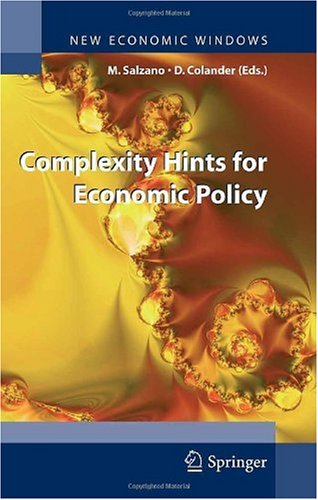

Most ebook files are in PDF format, so you can easily read them using various software such as Foxit Reader or directly on the Google Chrome browser.
Some ebook files are released by publishers in other formats such as .awz, .mobi, .epub, .fb2, etc. You may need to install specific software to read these formats on mobile/PC, such as Calibre.
Please read the tutorial at this link: https://ebookbell.com/faq
We offer FREE conversion to the popular formats you request; however, this may take some time. Therefore, right after payment, please email us, and we will try to provide the service as quickly as possible.
For some exceptional file formats or broken links (if any), please refrain from opening any disputes. Instead, email us first, and we will try to assist within a maximum of 6 hours.
EbookBell Team

4.3
78 reviews
ISBN 10: 8847005337
ISBN 13: 978-8847005334
Author: Massimo Salzano, David Colander
To do science is to find patterns, and scientists are always looking for p- terns that they can use to structure their thinking about the world around them. Patterns are found in data, which is why science is inevitably a qu- titative study. But there is a difficulty in finding stable patterns in the data since many patterns are temporary phenomena that have occurred r- domly, and highly sophisticated empirical methods are necessary to dist- guish stable patterns from temporary or random patterns. When a scientist thinks he has found a stable pattern, he will generally try to capture that pattern in a model or theory. A theory is essentially a pattern, and thus theory is a central part of science. It would be nice to have a single pattern - a unified theory - that could serve as a map relating our understanding with the physical world around us. But the physical world has proven far too complicated for a single map, and instead we have had to develop smaller sub maps that relate to small areas of the physical world around us. This multiple theory approach presents the pr- lem of deciding not only what the appropriate map for the particular issue is, but also of handling the map overlays where different maps relate to overlapping areas of reality. It is not only science that is focused on finding patterns; so too are most individuals.
Chapter1 : Introduction
Chapter 2: Content
Chapter 3: Conclusion
Chapter 4: Appendices
Chapter 5: Glossary
Chapter 6: References
Chapter 7: Index
complexity of public policy problems
complexity economics
complexity of issues
complexity economics for environmental governance
complexity theory economics
Tags: Massimo Salzano, David Colander, Complexity Hints, Economic Policy